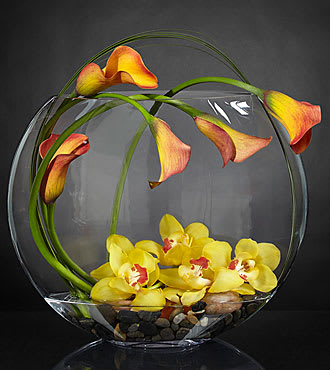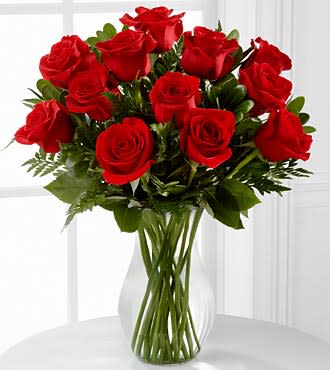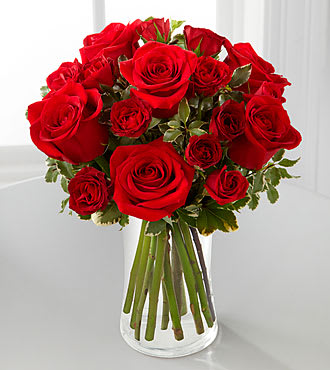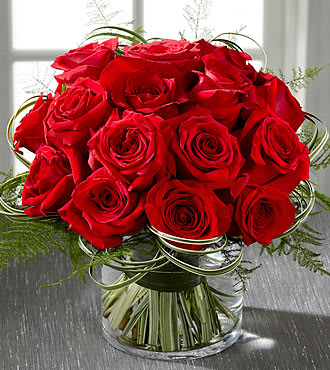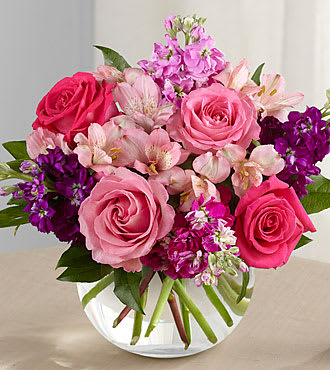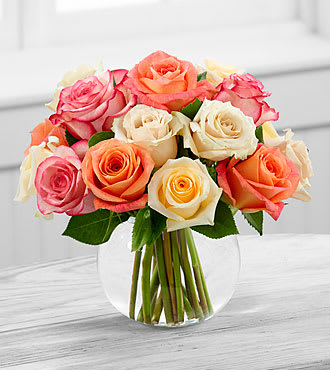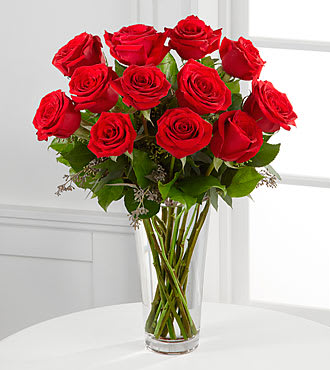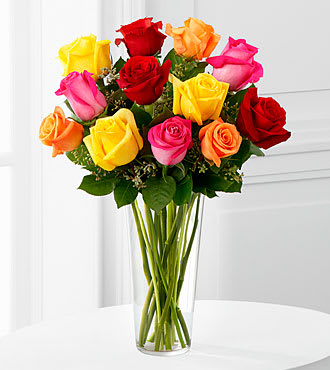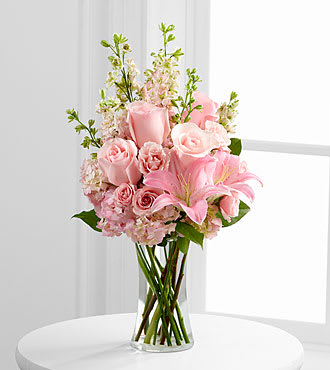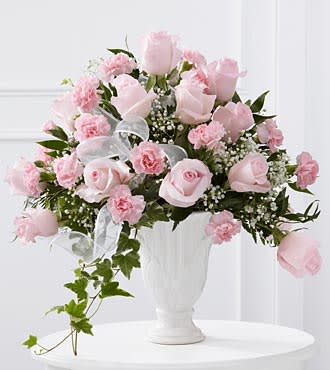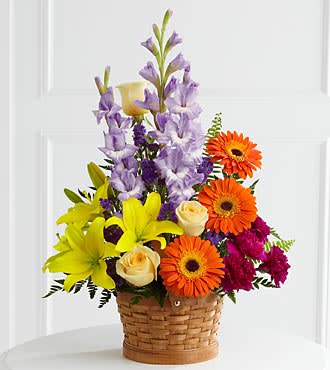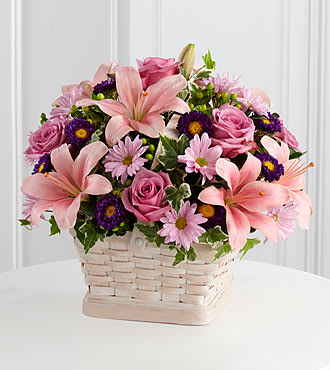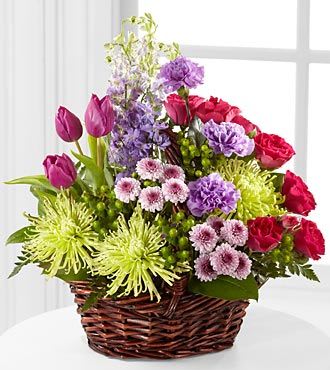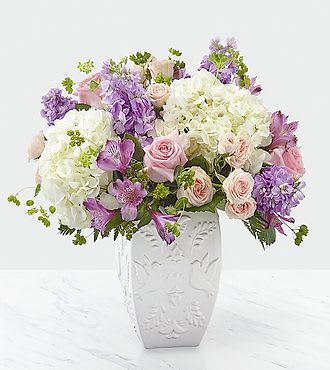- Love & Romance
- Best Sellers
- Under $100
- $97.90
- $44.90
- $89.90
- $89.90
- $87.90
- $97.90
June 1, 2025
Lukachukai June Floral Selection
The Bloom Central flower delivery of the month for June in Lukachukai is the Alluring Elegance Bouquet
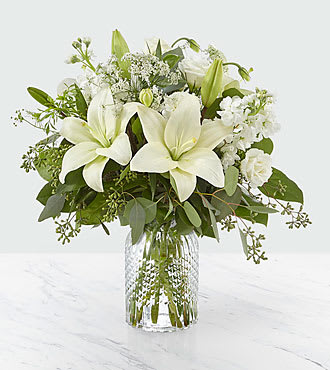
The Alluring Elegance Bouquet from Bloom Central is sure to captivate and delight. The arrangement's graceful blooms and exquisite design bring a touch of elegance to any space.
The Alluring Elegance Bouquet is a striking array of ivory and green. Handcrafted using Asiatic lilies interwoven with white Veronica, white stock, Queen Anne's lace, silver dollar eucalyptus and seeded eucalyptus.
One thing that sets this bouquet apart is its versatility. This arrangement has timeless appeal which makes it suitable for birthdays, anniversaries, as a house warming gift or even just because moments.
Not only does the Alluring Elegance Bouquet look amazing but it also smells divine! The combination of the lilies and eucalyptus create an irresistible aroma that fills the room with freshness and joy.
Overall, if you're searching for something elegant yet simple; sophisticated yet approachable look no further than the Alluring Elegance Bouquet from Bloom Central. Its captivating beauty will leave everyone breathless while bringing warmth into their hearts.
Local Flower Delivery in Lukachukai
Looking for flower delivery?
Looking to reach out to someone you have a crush on or recently went on a date with someone you met online? Don't just send an emoji, send real flowers! Flowers may just be the perfect way to express a feeling that is hard to communicate otherwise.
Of course we can also deliver flowers to Lukachukai for any of the more traditional reasons - like a birthday, anniversary, to express condolences, to celebrate a newborn or to make celebrating a holiday extra special. Shop by occasion or by flower type. We offer nearly one hundred different arrangements all made with the farm fresh flowers.
At Bloom Central we always offer same day flower delivery in Lukachukai Arizona of elegant and eye catching arrangements that are sure to make a lasting impression.
Spotlight on Olive Branches
Olive branches don’t just sit in an arrangement—they mediate it. Those slender, silver-green leaves, each one shaped like a blade but soft as a whisper, don’t merely coexist with flowers; they negotiate between them, turning clashing colors into conversation, chaos into harmony. Brush against a sprig and it releases a scent like sun-warmed stone and crushed herbs—ancient, earthy, the olfactory equivalent of a Mediterranean hillside distilled into a single stem. This isn’t foliage. It’s history. It’s the difference between decoration and meaning.
What makes olive branches extraordinary isn’t just their symbolism—though God, the symbolism. That whole peace thing, the Athena mythology, the fact that these boughs crowned Olympic athletes while simultaneously fueling lamps and curing hunger? That’s just backstory. What matters is how they work. Those leaves—dusted with a pale sheen, like they’ve been lightly kissed by sea salt—reflect light differently than anything else in the floral world. They don’t glow. They glow. Pair them with blush peonies, and suddenly the peonies look like they’ve been dipped in liquid dawn. Surround them with deep purple irises, and the irises gain an almost metallic intensity.
Then there’s the movement. Unlike stiff greens that jut at right angles, olive branches flow, their stems arching with the effortless grace of cursive script. A single branch in a tall vase becomes a living calligraphy stroke, an exercise in negative space and quiet elegance. Cluster them loosely in a low bowl, and they sprawl like they’ve just tumbled off some sun-drenched grove, all organic asymmetry and unstudied charm.
But the real magic is their texture. Run your thumb along a leaf’s surface—topside like brushed suede, underside smooth as parchment—and you’ll understand why florists adore them. They’re tactile poetry. They add dimension without weight, softness without fluff. In bouquets, they make roses look more velvety, ranunculus more delicate, proteas more sculptural. They’re the ultimate wingman, making everyone around them shine brighter.
And the fruit. Oh, the fruit. Those tiny, hard olives clinging to younger branches? They’re like botanical punctuation marks—periods in an emerald sentence, exclamation points in a silver-green paragraph. They add rhythm. They suggest abundance. They whisper of slow growth and patient cultivation, of things that take time to ripen into beauty.
To call them filler is to miss their quiet revolution. Olive branches aren’t background—they’re gravity. They ground flights of floral fancy with their timeless, understated presence. A wedding bouquet with olive sprigs feels both modern and eternal. A holiday centerpiece woven with them bridges pagan roots and contemporary cool. Even dried, they retain their quiet dignity, their leaves fading to the color of moonlight on old stone.
The miracle? They require no fanfare. No gaudy blooms. No trendy tricks. Just water and a vessel simple enough to get out of their way. They’re the Stoics of the plant world—resilient, elegant, radiating quiet wisdom to anyone who pauses long enough to notice. In a culture obsessed with louder, faster, brighter, olive branches remind us that some beauties don’t shout. They endure. And in their endurance, they make everything around them not just prettier, but deeper—like suddenly understanding a language you didn’t realize you’d been hearing all your life.
More About Lukachukai
Are looking for a Lukachukai florist because you are not local to the area? If so, here is a brief travelogue of what Lukachukai has to offer. Who knows, perhaps you'll be intrigued enough to come visit soon, partake in some of the fun activities Lukachukai has to offer and deliver flowers to your loved one in person!
The sun in Lukachukai does not so much rise as gather itself from the edges of the Chuska Mountains, spilling light like a slow-motion avalanche over the red sandstone and the scatter of juniper that clings to the high desert. The air here smells of sage and dry earth, a scent that seems to bypass the nose and go straight to the brainstem, triggering some primal recognition of place. You stand on a dirt road just off Highway 191, watching a pickup truck kick up dust as it disappears toward the horizon, and you think: This is a town that knows how to hold stillness close, to wear its silence like a second skin.
Lukachukai is not a place you pass through on the way to somewhere else. It is a destination that demands you come intentionally, winding up into the Navajo Nation’s heartland where the sky domes vast enough to make your knees wobble. The people here move with the unhurried precision of those who understand land as a verb. A grandmother in a velvet skirt tends a flock of sheep, her hands deftly guiding them toward pasture. Children sprint laughing between trailers and traditional octagonal hogans, their sneakers kicking stones that have lain in the same spot for millennia. Every face you meet offers a nod, a soft “Yá’át’ééh,” a greeting that feels less like hello and more like an acknowledgment of shared existence.

Same day service available. Order your Lukachukai floral delivery and surprise someone today!
What strikes you first, after the light, after the sheer scale of the sky, is the way time behaves here. It loops. It spirals. A man selling mutton sandwiches at a roadside stand tells you his great-grandfather once herded sheep in the shadow of the same rock formation you see over his shoulder. A weaver demonstrates how she twists yarn from Churro wool, her fingers moving in patterns passed down through generations, the rug beneath her taking shape as both art and ledger, its geometric symbols encoding stories older than the state of Arizona. History here is not something studied. It is worn, lived, breathed.
The land itself seems conscious. Lukachukai sits at 6,500 feet, a high desert basin where the cold bites sharp in winter and summer afternoons shimmer with heat. You hike a trail strewn with volcanic debris, and a local teenager points to a petroglyph etched into a basalt boulder: a spiral, a hunter, a constellation. “That’s not ancient,” he says. “That’s now.” You squint, and for a disorienting second, the carving feels less like a relic than a live broadcast, a message still being transmitted.
Community here operates as a quiet engine. At the chapter house, elders debate water rights in Diné and English, their voices rising and falling like wind over mesas. Down the road, a teacher drills students on verb conjugations, her classroom posters declaring “T’áá Diné Bizaad Béédahózin, Know Your Navajo Language!” Later, at a birthday party, someone unfurls a trampoline beside a corral, and kids soar upward, their silhouettes slicing the orange dusk. You hear drums that night, a distant heartbeat rhythm from a ceremony you know better than to ask about. Respect means understanding that not everything is for you.
By morning, the mountains have turned the color of bruised plums. You buy a cup of coffee from a vendor whose truck bed doubles as a kitchen, and she tells you about the upcoming fair, rodeo, fry bread competitions, a parade of horses dyed with clay. “You should stay,” she says, not pushing. You consider it. Because Lukachukai, in its unassuming way, does this: It makes you want to linger in its contradictions, to sit with the way it balances resilience and tenderness, tradition and improvisation. It is a place that refuses to vanish, that insists on its own presence, and in doing so, mirrors the desert’s quiet lesson, that survival is not about dominance but adaptation, not noise but the wisdom to listen.
You leave as you arrived: watching light. This time it’s the sunset, pulling shadows long across the scrubland, turning the world momentarily gold. Somewhere behind you, a harmonica plays a tune that’s half blues, half something older. The road ahead sinks into twilight, but the image that stays is the one in the rearview, a town small enough to fit in your palm, vast enough to hold universes.






